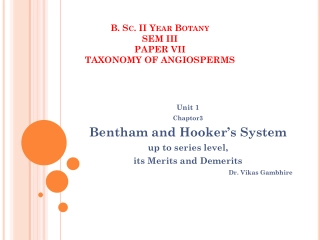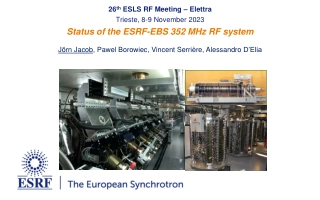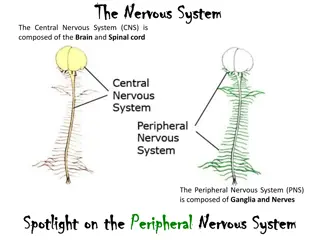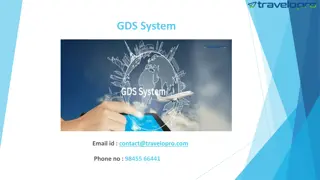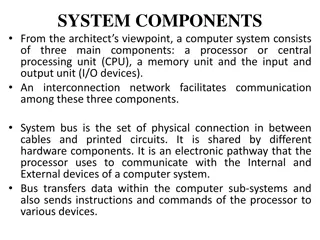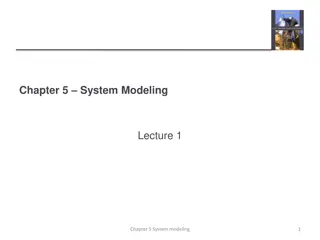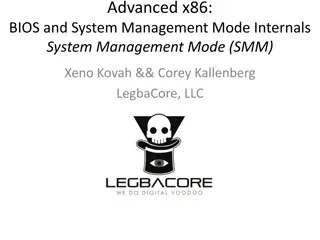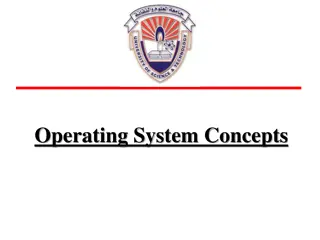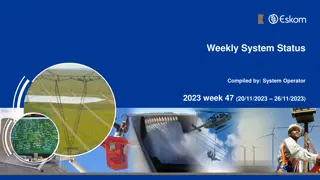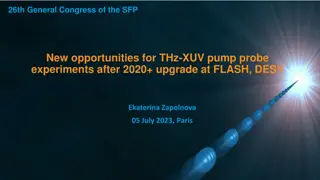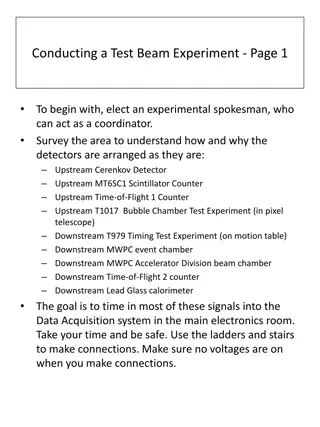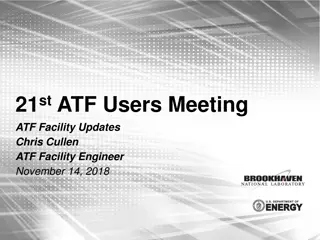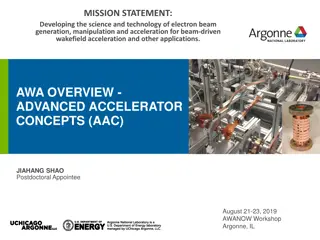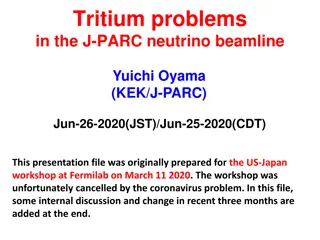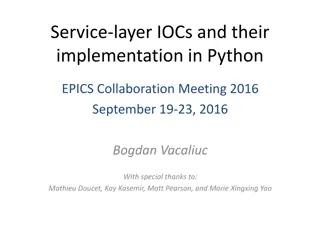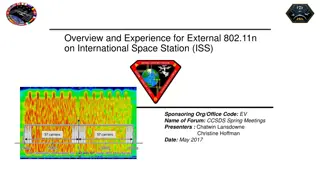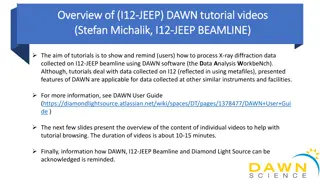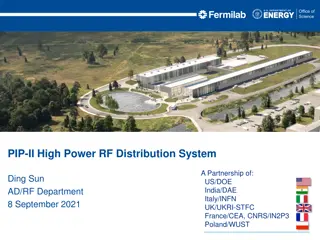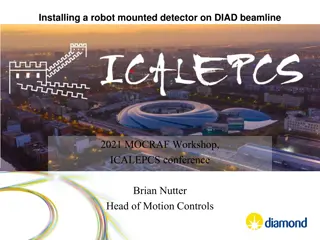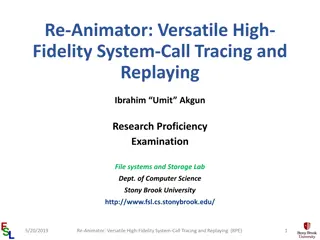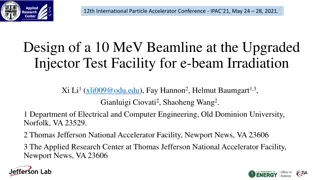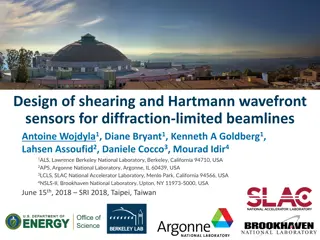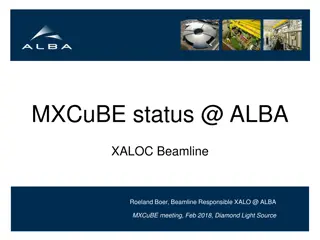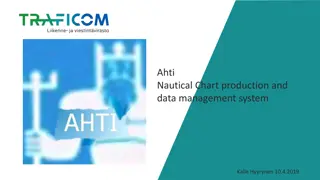Bentham and Hooker's System of Classification in Botany
Bentham and Hooker's system of classification in botany is a natural system based on a large number of characters considered simultaneously. Proposed by British taxonomists George Bentham and Joseph Dalton Hooker, this system categorizes seed plants into classes, orders, families, and genera. It is
2 views • 10 slides
Overview of ESRF-EBS 352 MHz RF System Upgrade at 26th ESL RF Meeting
The 26th ESL RF Meeting held at Elettra in Trieste discussed the status and upgrades of the ESRF-EBS 352 MHz RF system. The meeting covered topics such as the EBS RF layout, HOM damped cavities, RF ECO-Mode, ongoing RF projects, and the replacement of klystrons with SSAs for a 4th harmonic RF system
0 views • 16 slides
adonai software
Adonai college Management System is a cloud-based ERP System that delivers various College and School Management Systems, College and School Management Software, College and School Management System ERP, College and School Management Software System, Online College and School Management Software Sys
3 views • 1 slides
System Models in Software Engineering: A Comprehensive Overview
System models play a crucial role in software engineering, aiding in understanding system functionality and communicating with customers. They include context models, behavioural models, data models, object models, and more, each offering unique perspectives on the system. Different types of system
3 views • 33 slides
Understanding the Nervous System: CNS, PNS, SNS, and ANS
The nervous system comprises the Central Nervous System (CNS) and Peripheral Nervous System (PNS), with the PNS further divided into the Somatic Nervous System (SNS) and Autonomic Nervous System (ANS). The SNS controls voluntary movements of skeletal muscles, while the ANS regulates involuntary proc
2 views • 23 slides
APTM and GRID Beamline Elements
Presentation of beamline instrumentation concepts, project planning, and objectives for measuring beam properties at the European Spallation Source. Details include systems overview, beam monitoring instruments, tuning processes, and key parameters such as power, current, and pulse duration.
1 views • 19 slides
Exploring Collimators and Bunkers at ESS for Accelerator Radiation Activation
Dive into the study of collimators for a curved beamline, the design of ESS bunkers, and the innovative NMX instrument for biological macromolecule structure determination at the 4th International Workshop on Accelerator Radiation Induced Activation.
2 views • 40 slides
GDS System
Travelopro Global Distribution System (GDS) is a computerized network system. It is a large computer network which is integrated with 100 of worldwide Airlines and consolidators for enabling transactions between travel agents and travel sites and also used by airlines, hotels, car rentals, railways
4 views • 15 slides
Understanding the Immune System: Organs, Functions, and Importance
The immune system acts as a defense mechanism against pathogens and infections, comprising various organs, such as the bone marrow, thymus, spleen, white blood cells, antibodies, complement system, and the lymphatic system. It works to recognize and destroy harmful microbes, maintaining the body's h
1 views • 23 slides
Evolution of Land Law Systems in Trinidad and Tobago
Trinidad and Tobago's land law systems consist of the Common Law System and the Registered Land System. The Common Law system governs unregistered land where title passes upon execution and delivery of the deed. In contrast, the Registered Land System confers ownership upon registration and offers c
0 views • 28 slides
Understanding Computer System Buses: Components and Functions
A computer system comprises three main components - the CPU, memory unit, and I/O devices connected via an interconnection network, facilitated by the system bus. System buses reduce communication pathways, enabling high-speed data transfer and synchronization between components. Internal buses conn
3 views • 55 slides
Understanding System Modeling in Engineering
System modeling in engineering involves developing abstract models to represent a system from various perspectives using graphical notations like UML. These models aid in understanding system functionality, communicating with stakeholders, and documenting requirements for new systems. Existing and p
2 views • 53 slides
Rapid Identification System for Inmate Release
The Rapid Identification System, also called Rapid ID System, provides a quick way to verify an inmate's identity using fingerprints before release from custody. It allows law enforcement agencies, including IPD users under SDSheriff, to log in and access the system. By searching the San Diego AFIS
3 views • 8 slides
Understanding System Management Mode (SMM) in x86 Processors
System Management Mode (SMM) is a highly privileged mode in x86 processors that provides an isolated environment for critical system operations like power management and hardware control. When the processor enters SMM, it suspends all other tasks and runs proprietary OEM code. Protecting SMM is cruc
1 views • 26 slides
Revolutionizing Paper Mill Operations with AutoRate System by P.L.C
AutoRate system by P.L.C offers a superior alternative to manual feed rate control in paper mills, addressing issues of operator variability and inconsistent system responses. By utilizing a Virtual Controller based on inherent system values, the system enhances overall consistency and efficiency, r
2 views • 12 slides
LJMU's New Curriculum Management System Project Overview
LJMU's new curriculum management system project aims to streamline course information production and storage by implementing the Courseloop system. The project timeline includes releases for data governance, migration, testing, and training leading up to the system's go-live in September 2022. The p
1 views • 8 slides
Understanding Operating System Concepts: Lecture Overview and Services
Exploring the lecture content on operating system concepts, structures, services, system calls, and file manipulation. Delve into the importance of operating system services, error detection, program execution, I/O operations, protection, security, and resource allocation in operating systems. Learn
4 views • 26 slides
System Sequence Diagrams: Understanding Artifact for System Behavior
System Sequence Diagrams (SSDs) are vital artifacts that visually illustrate input and output events related to a system. They help define system behavior and interactions, making them essential during the logical design phase of software applications. By depicting events in sequential order, SSDs o
2 views • 24 slides
Weekly System Status Update: Adequacy of National Electricity Supply (Week 47, 2023)
This weekly system status report compiled by the System Operator provides insights into the National Electricity Supply System's adequacy in the medium term. It includes data on historic daily peak system capacity/demand, available dispatchable generation, operating reserve margin, forecast vs. actu
1 views • 14 slides
Cutting-Edge Insights from the 26th General Congress of the SFP
Explore the latest advancements in THz-XUV pump probe experiments post the 2020+ upgrade at FLASH, DESY, presented by Ekaterina Zapolnova at the 26th General Congress of the SFP. Discover the intense XUV and THz radiation capabilities at FLASH, applications in structural and electron dynamics of mol
0 views • 13 slides
Conducting a Test Beam Experiment - Step-by-Step Guide
In this step-by-step guide, you will learn how to set up and conduct a test beam experiment. The experiment involves connecting detectors such as Cerenkov Detectors, Scintillator Counters, Bubble Chambers, and more. The process includes handling signal cables, high voltage connections, and checking
1 views • 5 slides
ATF Facility Updates and Enhancements Meeting Summary
Updates and improvements at the ATF Facility as discussed in a meeting include re-polishing of gun cathode, enhanced vacuum systems, reconfiguration of the experimental hall, improvements in beamlines for LWFA and ICS experiments, and new shielding configurations. Beamline enhancements allow for bet
0 views • 16 slides
Advancing Electron Beam Technology for Accelerator Applications
Focusing on electron beam generation, manipulation, and acceleration, this initiative aims to drive advancements in beam-driven wakefield acceleration and related fields. The program at AWA explores high-gradient acceleration for future colliders, collaborating on research and development projects w
0 views • 21 slides
Tritium Problems in J-PARC Neutrino Beamline - Recent Developments and Future Implications
This file discusses the issues related to tritium production in the J-PARC neutrino beamline, particularly focusing on the tritium release from steel walls to cooling water and air. It highlights the concerns regarding potential serious problems in the future and the measures undertaken to address t
0 views • 16 slides
Overview of UNIX System Protection
UNIX System Protection focuses on ensuring security and access control mechanisms within the UNIX operating system. Developed in 1969 by Dennis Ritchie and Ken Thompson at AT&T Bell Labs, UNIX features design elements like a portable API, protection rings, kernel processes, and a trusted computing b
0 views • 12 slides
Overview of CRWG Issues and Requests for 10Hz Operation and APS Role
This document discusses CRWG issues related to the 10Hz operation, including the need for 10Hz collision operation, parameter sets for different energy levels, and the addition of a beamline for 10Hz operation. It also covers the APS role in commissioning positron facilities and its usefulness for v
0 views • 14 slides
Designing a Novel Low-Energy Beamline for NA61/SHINE at CERN
Carlo A. Mussolini from the University of Oxford, working at CERN, is designing a new low-energy beamline for NA61/SHINE experiment. The need for a low-energy beamline arises from the lack of particle production data in the 1-13 GeV/c momentum range. Current beam facilities at CERN face challenges w
0 views • 24 slides
Implementing IOC in Python for Enhanced Automation in EPICS Collaboration Meeting
Beamline instrumentation systems require high automation levels, and EPICS is used as a client/server system with extensive server code support for various hardware types. By implementing a service-layer IOC in Python, the server IOC can focus on hardware operation specifics separately from equipmen
0 views • 14 slides
Muon Campus Operation Report & Performance Summary
This report provides an overview of the Muon Campus operations, including activities conducted, machine downtime, G-2 performance integrated for Run 4, and upcoming plans. Key highlights include beam delivery to G-2, maintenance work, beamline studies, and the status of experiments. The report also
0 views • 5 slides
Overview of External Wireless Communication System on International Space Station (ISS)
This presentation covers the overview and experience of implementing an external 802.11n wireless communication system on the International Space Station (ISS). It discusses the existing wireless system, committed users, system architecture, and future challenges. The system provides high data rate
0 views • 18 slides
X-ray Diffraction Data Processing Tutorials with DAWN Software
Learn how to process X-ray diffraction data collected on I12-JEEP beamline using DAWN software through a series of tutorials. Discover features applicable to similar instruments and facilities, presented in 10-15 minute videos covering topics like data viewing, processing, calibration, and peak fitt
0 views • 13 slides
PIP-II High Power RF Distribution System Overview
The PIP-II High Power RF Distribution System is a collaborative project involving various countries and institutions to develop a sophisticated system capable of efficiently distributing RF power to superconducting cavities. The system consists of multiple distribution lines and components designed
0 views • 28 slides
Installation of Robot-Mounted Detector on DIAD Beamline
Installing a robot-mounted detector on the DIAD beamline for the 2021 MOCRAF Workshop at the ICALEPCS conference. The robot arm holds a diffraction detector for dual imaging and diffraction purposes, ensuring safety for personnel, equipment, and integration into EPICS and GDA systems. Functionality
0 views • 28 slides
Long-Baseline Neutrino Facility (LBNF) Primary Beamline LCW System Overview
The Long-Baseline Neutrino Facility (LBNF) Primary Beamline Low Conductivity Water (LCW) System comprises various technical design aspects including system operational scope, major system updates, design requirements, and component summary. It involves the provision of LCW cooling for magnets and po
0 views • 14 slides
Re-Animator: Versatile System Call Tracing and Replaying
Re-Animator is a research project focusing on creating a high-fidelity system call capturing system with minimized overheads. The project aims to capture long-running applications and provide scalable and verifiable system call replaying. It introduces two prototype system call tracing systems and h
0 views • 39 slides
Design of a 10 MeV Beamline for E-beam Irradiation at UITF Wastewater Facility
This paper discusses the design of a 10 MeV beamline at the Upgraded Injector Test Facility for electron beam irradiation, focusing on wastewater treatment for environmental restoration. The use of electron beam irradiation is highlighted as an effective method to remove pollutants like 1,4 dioxane
0 views • 9 slides
Shearing and Hartmann Wavefront Sensors for Diffraction-Limited Beamlines
Design and upgrade of wavefront sensors for diffraction-limited beamlines at various national laboratories, focusing on advanced light sources and soft X-ray applications. The sensors aim to monitor wavefront perturbations and optimize beam quality for enhanced performance. Various sensor designs an
0 views • 22 slides
Strategies for Enhancing Extended Producer Responsibility System in Bulgaria
Korea-Bulgaria Knowledge Sharing Program focused on sharing strategies to enhance Bulgaria's Extended Producer Responsibility (EPR) system. The program discusses the current status, performance evaluation, issues, and recommendations related to the EPR system in Korea. It covers topics like beverage
0 views • 38 slides
Progress Update on MXCuBE Integration at ALBA Xaloc Beamline
Update on the integration of MXCuBE 2 at ALBA Xaloc Beamline, highlighting current status, implementation details, and ongoing developments. The project involves the use of SARDANA, TAURUS, and TANGO for beamline control, with a focus on hardware, user interface, and data management. The collaborati
0 views • 13 slides
Ahti Nautical Chart Production and Data Management System Overview
Ahti Nautical Chart Production and Data Management System, led by Kalle Hyyrynen, aims to modernize nautical chart production by utilizing standardized products, improving system technology, and enhancing data management. The project addresses challenges such as outdated technology, integration need
0 views • 7 slides
